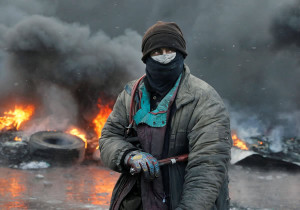
Concerning the causes of turmoil in Ukraine, the Egyptian newspaper “Al-Masry Al-Youm” concluded that the country was “was not willing to pay the price of freedom and independence” after 1991. The obsession with the dream of joining the European Union was not backed by the hard work and efforts of Ukrainian citizens. The local population had high demands but opportunities to achieve those were somehow limited. Degradation of the economy, growth of external debt, massive unemployment along with corruption triggered a wave of discontent which was quickly followed by revolutionary protests.
The last of them – «Euromaidan» events of November 2013, brought new casualties and skirmishes and consequently resulted in the breakaway of Crimea. The breakaway that can seriously endanger the stability of Ukraine.
Some media sources projected the events of the Arab Spring on the situation in Ukraine. According to them democratic reforms can not be carried out without the evaluation of the ethnic composition of a society. The countries that are more homogeneous can create a stable state relatively painlessly, analysts say, but those that are not are risking to face conflicts and confusion, Libya and Yemen can serve an avid example of this.
Therefore, some authors believe that the Kiev authorities have failed in finding a rational approach to the regional and linguistic specifics and thus provoked discontent among the Russian-speaking population, which resulted in the present turmoil .
Against the backdrop of growing tension between Russia and the West the media and politicians have started to voice concerns about the return of the Cold War, however a number of Arab commentators remains sceptical about this perspective.
An influential London based Arabic newspaper “Al-Quds ” believes that this notion can not be taken seriously since the balance of powers has drastically changed since the Cold War era times. We witness, the newspaper says, the signs of the formation of a multi polar world that portends the sunset of a sole hegemony that emerged after the collapse of the USSR in 1991. United States have ultimately failed to prevent the emergence of a powerful new Asia, with strong regional and international players: China, India , Japan and Iran. The invasion of Iraq 11 years ago in violation of international law opened a Pandora’s box. Thus Washington is experiencing a decline of its influence in the Middle East
The Arab media space is watching closely the sanctions the West now applies to Russia in order to “restrain” it.
Some analysts , referring to predictions of their impact on the Russian Federation, reminds of strong economic attachments a number of countries has today to each other, these attachments should prevent the outbreak of an economic war between members of the international community, since this war can have devastating consequences for all the parties involved.
The authors emphasize that Europe is now experiencing an economic downturn and is interested in developing economic relations with Russia, perhaps even more than Moscow. We are talking about energy supplies from Russia to the EU .
Zakaria Jaber – Professor of History of International Relations , Deputy Director of the “Arab House” in Ukraine believes that Moscow is not opposing the Kiev’s association with the European Union. The main thing for Kremlin, he said in an interview with a Saudi television channel “Ihbariya” is not to see Kiev in the NATO ranks, since it is not willing to see NATO troops on the Russian Federation borders. Moscow wants a neutral Ukraine, with which it has a millennia-old ties, that can become an economic bridge between it and the EU.
Commentator of the Arab newspaper ” Al-Arab ” notes that the international price of gold fell last week in comparison with the peak of tension in Ukraine. Fell despite the forthcoming sanctions promised by Washington and Brussels to be implemented against Moscow. Despite all the talks the markets, as seen , remain confident.
The Arabian observers note that in advanced countries the importance of political events is always measured by the reaction of financial markets. They run their capital according to their own thorough assessment of what is going to happen, away from the loud statements or emotional rhetoric.
Yuri Zinin, Senior Researcher at MGIMO, exclusively for the online magazine “New Eastern Outlook”.
